There’s something about French guys… and you just want to hear what they have to say! I’m often asked what my husband thinks about American culture, food, the people and more. Curious minds want to know what French guys think about all kinds of things, so today, my husband, Tom, is bringing you the second post in a new series called The Frenchman speaks: Ask Tom Tuesdays. He’s answering your questions about whatever you want to know….
Today’s topic? The often misunderstood American and French social differences! GO!!
Ask Tom Tuesdays: American and French social differences
Again, I want to extend a BIG THANK YOU to my husband for being a part of my blog. It’s not easy to write well in your second language and he makes me really proud. Let’s do this….
Question: An earlier post of Diane’s mentioned that you’re a twin and you and your brother got asked a LOT if you were twins by random people in New York last year — something that doesn’t ever happen in France. It was of particular interest because I’d totally ask someone that and think nothing of it. What other social differences do you notice between Americans and the French? –From a reader named Christine
Tom’s answer:
So to start, I find that Americans tend to be more enthusiastic about social interactions.
Just to give a quick example, we were recently back in the U.S. and happened to be in a little gift shop on the Jersey Shore. When the college-age cashier heard my accent and learned we live in France, she was over-the-top excited about it and said several times, “Oh my God, that is SO COOL. That is the coolest thing I’ve EVER heard.”
She was really excited and had a lot of follow-up questions. It was an enthusiasm I’ve heard from others in the U.S. when they see I’m French and something you’d never get in France. The French are just more reserved and in a casual situation where you don’t know the person, there are boundaries as to what’s polite in conversation.
I’ve also noticed that the conversation subject matter tends to be more open with Americans, like personal topics are discussed, even if people don’t know you — about family, where you’re from, where you’re going, etc. In France there’s a social “convention” that makes us not ask about something we consider private. The boundaries here in France are not the same.
The private “sphere” is considered something very important, almost “sacred” (or holy), and is to be respected.
It would be considered really rude to cross that boundary with strangers. It’s also what marks the difference in the degree of friendliness/friendship. What is just “small talk” in the U.S. might never happen in France.
To further explain, here are some recent examples of questions that come to mind that you wouldn’t ask in France casually (and questions I was surprised people I didn’t know would ask me in the U.S.): Are you twins? Where did you meet (after knowing I was married to an American), Where are you from (asking Diane who is clearly American, just in passing when in the Keys or Southern Florida in general).
In France, Diane is sometimes surprised about this aspect of French “manners”; it makes her sad sometimes that people don’t ask questions like where she’s going on vacation or follow-up questions after she says something — because it makes her think that people don’t care, whereas they’re just “respecting” the boundary of private space. They’re just being polite by doing that!
So while asking certain more private questions in France appears rude, it’s normal in the U.S. and even welcomed. Not asking those questions is seen as polite in France when it’d be almost proof of disinterest in the U.S.
In France asking too much is seen as curiosity, which isn’t seen as something good/polite.
So yes, it appears that when talking to them, American people want to know more about you than French people would want to know — or at least publicly admit to.
Now is that the truth? Are American people really more interested in each other, or is that only a superficial habit that’s the norm?
I don’t really know. It makes me think of the phrase you almost hear every time you enter a store or restaurant in the U.S. — yes, you know that sentence, the famous “Hi, how are you (today)?” (I’m not even talking about the, “Hey what’s up?” that you hear at Abercrombie stores!!!)
Now we all know that everyone’s answer is, “Good, thank you” (or something like that). Has anyone ever responded in the history of the world, “Well, actually, I don’t feel good today. Let me talk to you about my problems…” to a cashier or waiter?
We also say in French, “Bonjour, comment ça va?” but we say that between people that know each other, at least a little bit (coworkers, friends, acquaintances you see often), and the expected answer is pretty much the same (except maybe when it’s a close friend to who you know you can really talk about your private life and your potential problems). I think I’d be caught off guard if upon entering a store in France I heard, “Bonjour, comment allez-vous?”
(Although French people also show politeness — which Diane wrote about French politeness a few months ago — even sometimes too much, with the all variety of “bonjour, au revoir, merci…”. Diane actually loves the “bon dimanche” (have a good Sunday). It’s what cashiers say when you leave the boulangerie on a Sunday, after purchasing your bread. And the “worst” is when someone tells you thank you (merci), you reply “you’re welcome” (je vous en prie / which is the formal way of saying “de rien” that you’d say to someone a little more familiar) and some people even say “c’est moi” (you can also hear “mais c’est moi”), meaning “I am the one who thanks you.”)
Ahhh bisous — don’t touch me! (says Diane jokingly)
The fact that in social interactions American people seem more “familiar” and talk about personal things with strangers than French people makes it almost contradictory that in the US you don’t kiss (do bisous). The cheek kiss is what we do in France instead of a hug or handshake (although in some social settings a handshake is normal, like in business or someone you don’t know that well).
Of course we don’t do cheek kisses with complete strangers but with relatives, friends, coworkers sometimes, friends of friends (when being introduced). It seems that the French are more reserved socially but when it comes to physical contact, we go right in for the cheek kiss and Diane finds it a bit uncomfortable. She’d much rather hug. She even hugged my dad once and he just stood there totally confused. Now she does bisous. 😉
Let’s talk about food
In France, we don’t “joke” with food. We take meals seriously and it’s a part of the way we socially interact with people (the big meal on Sunday). Also, when you invite people over, you don’t invite them for sandwich or just a little meal. You have to put up the big show (several courses, from the “apéro” to the dessert and even the digestif) and you stay at the table for hours (almost like Thanksgiving dinner every Sunday). We don’t graze or serve a quick little meal.
And what about taboo subjects
In the U.S., you don’t really talk about someone being fat to their face. It’s considered rude to tell a relative that he/she gained weight. It seems rather taboo there, while in France people can talk about it (say you gained weight, even say it to a friend) and it’s not seen as an insult. Just matter of fact and that’s not something that would be a welcome conversation topic in the US.
Staring contest or just eye contact?
I noticed that on the NYC subway, New Yorkers just act too cool to care about anyone else on the train. They don’t make eye contact and try to just look past others around them. But on the Paris metro, it’s totally fine to make eye contact. We don’t stare others down but it’s OK to look at someone. (Diane’s note: I was definitely involved in a few staring contests on the Paris metro with my friend Melissa a few years ago on vacation. Men and women equally hold their glance a few seconds too long making it uncomfortable for a former New Yorker. I looked away the first few times but then figured out staring contests were kind of fun and won a few after the French person got uncomfortable. Took maybe 4 seconds.)
So readers, what differences have you noticed with social interactions between Americans and the French? Did any of Tom’s answers on French social differences surprise you?
Do you have a question for Tom?
Submit your questions in the comments below, via email here or on Facebook or Twitter. Maybe you’ll see it answered in a future post (hope to run this once a month or whenever Tom has time). And as always, thank you for stopping by!
PIN ME:


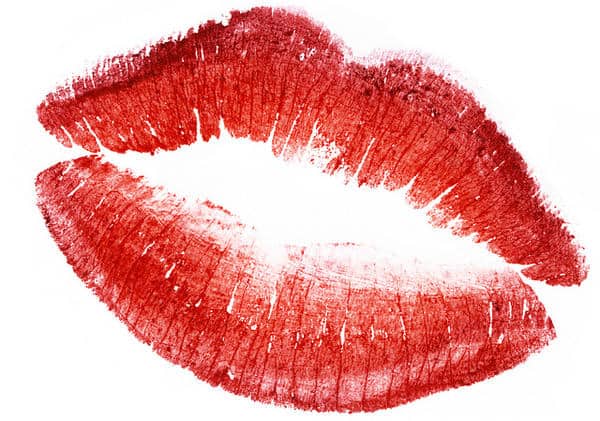

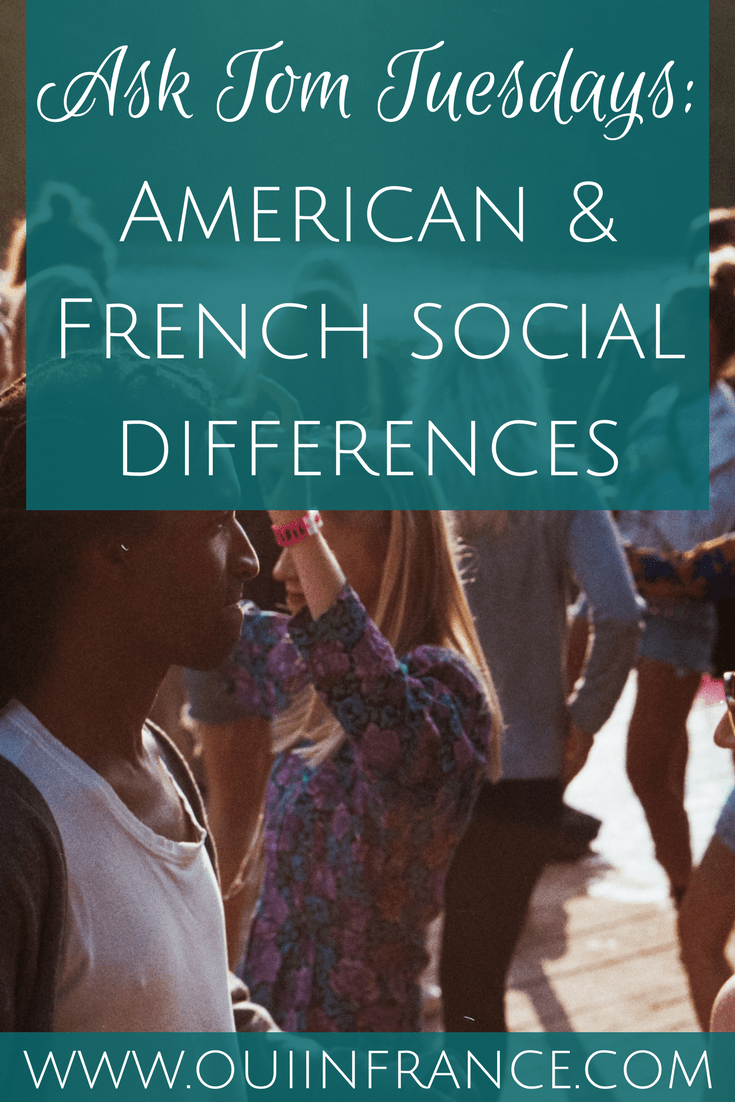
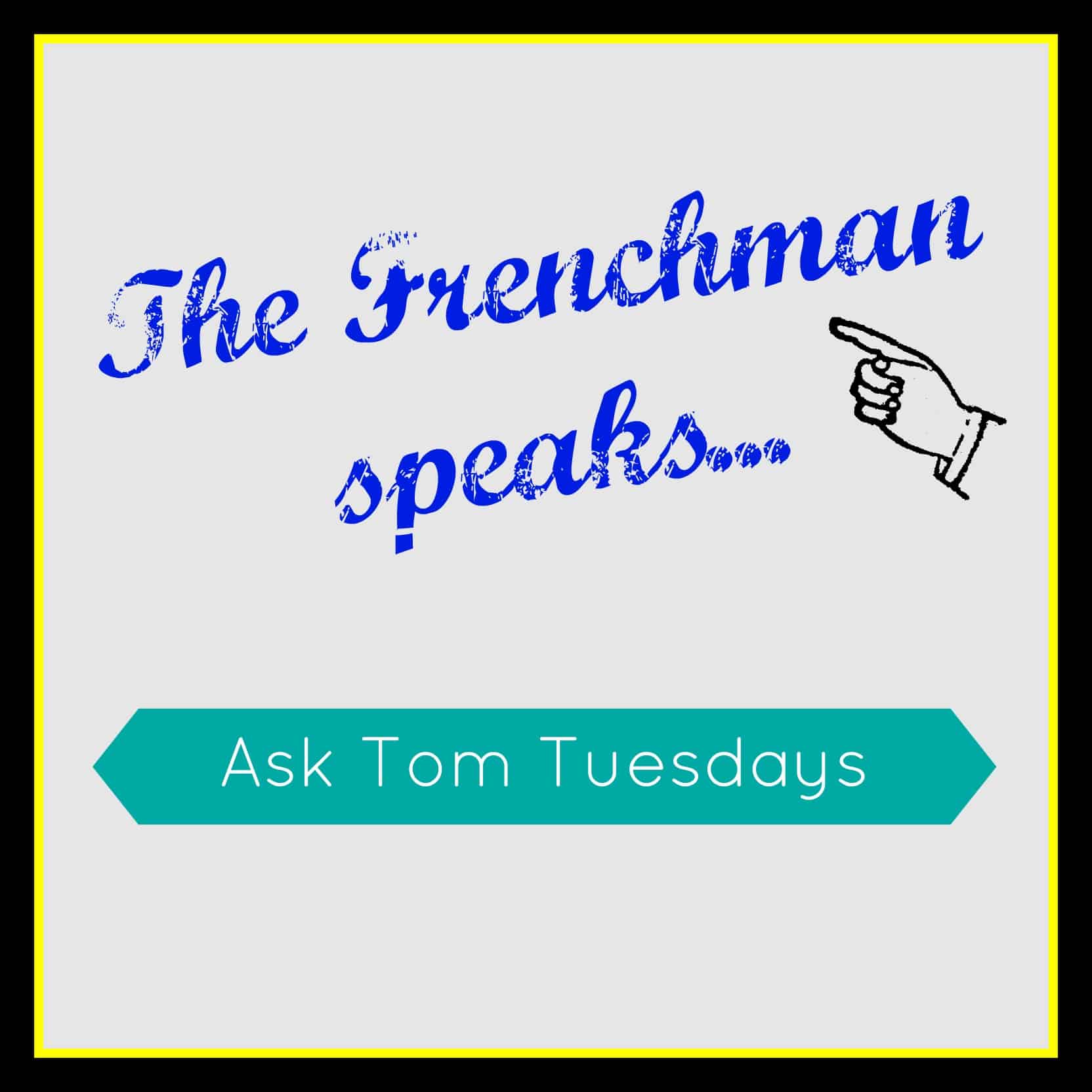

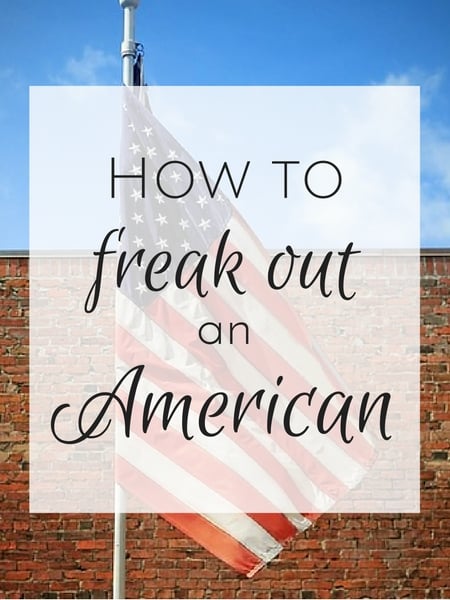
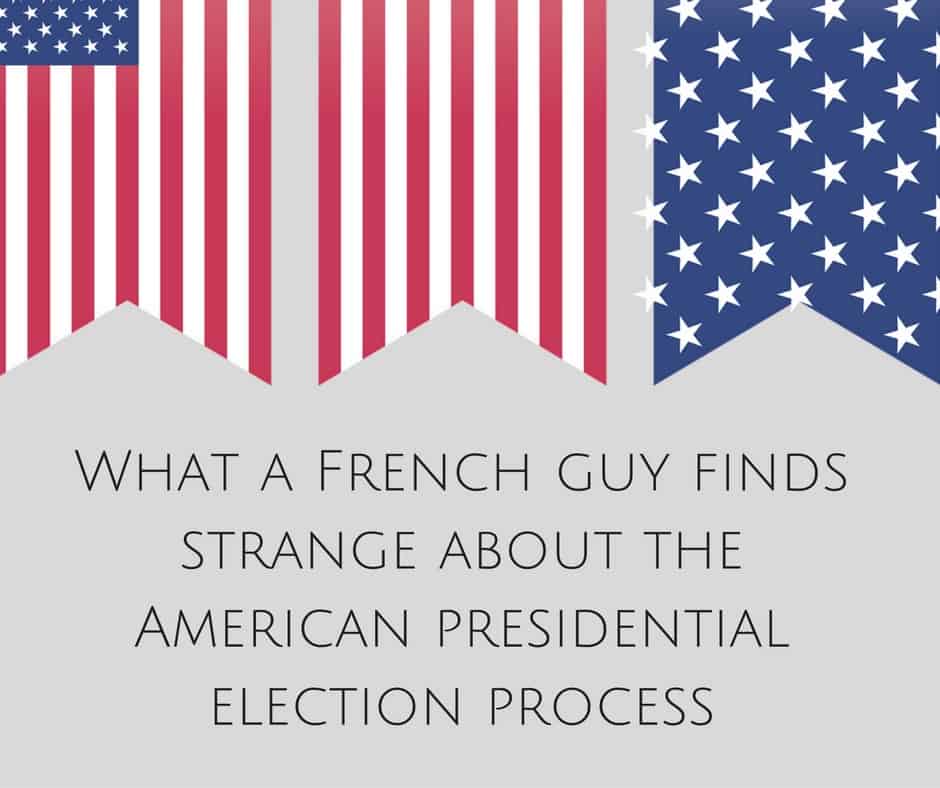

Hello Diane and Tom. I’ve been reading your blog for awhile and I always enjoy your posts. Just a few days ago, I was trying to explain to my parents how the French don’t make little conversations with strangers like American do. I sent them this post, because I think you explained this cultural difference very well. I didn’t realize how I missed that aspect of American culture until a recent trip back to the US.
Yes, the small talk is a major difference that I think takes time to really pick up on. It’s not as in-your-face as other differences between the cultures. Thanks for checking out the post and sharing!
Well, sometimes I wish that Americans wouldn’t be so curious! For example, people I don’t know well ask me if I have kids. This, to me, isn’t appropriate small talk. That’s personal!
However, when some stranger holds a door open for me and then asks me what I think about the weather, it’s ok. Weird I know. I live down south, where many people are like that Target cashier on Saturday Night Live. Whether or not that annoys me really just depends on my mood that day. Either way, I think about the intentions behind those speaking. That egg vendor at the farmer’s market who always stops me to ask 10 questions about my dog isn’t trying to be annoying. However, I do avoid her!
When I returned from my trip to Paris people were shocked to hear me say that I don’t think the French are rude. They were always very helpful to me when I needed something, but these were people in shops and museums. It was their jobs. If I had bothered a random person on the street, I’m not sure of the response I would have gotten. I think Americans who call the French rude just don’t respect that cultural difference.
PS– I’m horrified to ever invite anyone over if I live in France. That meal sounds complicated. 🙂
Haha, don’t stress about the meal. Whatever you make when that time comes, everyone will appreciate your efforts. And if it’s a disaster, have something from Picard in the freezer ready to go. Also, I agree that the questions are all about one’s intentions and that even when intentions are good, sometimes the questions don’t go over well, as in your case w/the lady at the market and your dog. The culture differences are fascinating, so if you have a question for Tom for the next series, please send it along!
Do you know Ella Coquine? It’s so funny today because she just wrote a post about the differences that her and her French husband have noticed between the way Americans interact with strangers and the way French people do. I honestly never gave it much thought before but after reading two of these posts today, I’ll be asking my husband what his impressions are 🙂
Yup saw the post on the same topic. Let me know what your husband thinks!
Ah, the French and their love of talking about weight. When I came back to start grad school, my boyfriend’s mom commented on how my face looked better because I had lost weight in it. My boyfriend has also done this once or twice, but now he knows better.
One thing I just don’t get at about French social customs is that when you enter/exit an elevator, you’re supposed to say hello and goodbye to everyone to seem polite…but then you ride all the way up/down without saying another word. If I say hi to someone in an elevator, I feel like I should make small talk.
Funny, this “staring” subject.
I am an airbnb host in Paris, and out of 6 US citizens hosts, 3 asked me and were worried about people staring, wondering if they were normal or looked like they were not french.
Hahha, yes it’s unnerving to those not used to being stared at. The metro is the worst!
It’s always surprising for a French tourist to hear “hi how are you ?” each time you enter a store. I was first a bit ill-a-ease and I would definitively be stunned if a French cashier asked me how I am. However my boyfriend often mocks my way of saying good bye in the US (bye, have a nice day/evening), saying that it is awkward.
I’m not very comfy with the “bisous” part even if we do it all the time (most of the time without even touching the cheek of the person you’re kissing).
I’ve lived in Belgium for a year and a half now and my neighbor is my age. Mind you I am 16 🙂 From the first time we saw each other we liked each other but we never said anything. Now we have been talking through Facebook and going on walks for 2 months now. He has told me in English that he “appreciates my company.” I’m not sure what that means, haha. His family (him mum, his dad, his twin sisters) know how he feels about me, his mother has even told me but while he was with someone else. His family know EVERYTHING. Is that normal? We speak both French and English together but I want to tell him that “I like him” in French so that the understanding is mutual but places say that its “Je t’appreciate bien” or “Je t’aime bien” but I am afraid that appreciating him is not enough and putting Je t’aime out there is dangerous. Merci d’avance 🙂
Hi there, just asked my French husband for you and he said you can say “Je t’apprecie beaucoup” which would convey the fact that you enjoy his company. But you can say “je t’aime beaucoup” (or bien like you said) which doesn’t mean I love you a lot like it would in English but is more of a “I like you.” Aimer would be stronger than apprecier but neither one means i love you with the beaucoup at the end, so either would work. Hope that helps. Good luck!
This was ages ago and correct me if I’m wrong, but I feel like “je t’adore” may also be appropriate in this situation!
Very interesting post Tom !! Actually, we don’t show less interest in people than in US, but there’s lot of things we don’t dare to ask when we don’t know well the person. For example, when I met someone or work with someone, there’s lots of questions I’d like to ask but I don’t dare to ask them because I fear the person thinks I’m strange or rude and feels annoyed. Then, the small talk can exist here but it’s harder to find someone who wants to do it.
Do people in provincial towns still say Mesdames sieurs when they go into a shop?
I often wondered whether one was supposed to check the number of men and women present and modify to Madame sieurs as the numbers present required…??
Hello Diane and Tom! I love your blog and am learning so much here. Tom, can you please clarify for me when you say it’s the worst when someone says “your welcome” (“je vous en pris/ de rien”) after someone says “thank you”. What should one say instead after someone says “thank you”? Should I just also say “merci” back to them? T
hank you so much for your help!
as a French, I’m pretty sure Tom didn’t mean it’s the worst! this is a French idiom that means something like “the strongest example is…”
Hi Sara!
Thanks for your question as it showed me that I absolutely need to clarify that part! Most important thing you should know is that it’s totally fine and absolutely not wrong to answer back “je vous en prie” or “de rien” to someone that just told you “merci”, it’s polite and that’s what you should use. Just like in English, you’d say “you’re welcome” if someone thanks you for something.
Now and as Cal said, when I mentioned “the worst”, I didn’t mean it literally, like it’s not a “bad” thing, I just wanted to overemphasize situations where French politeness is pushed at its strongest to the point where it almost becomes a bit ridiculous, and that’s particularly true about the sequence “merci – je vous en prie – (non) c’est moi, non c’est MOI”, in that case it’s like no one is going to stop using polite phrases like they could keep on telling each other polite stuff forever (and over nothing in most cases, or really not important matters, like something as simple as a grocery store interaction between a customer and a cashier.). Hope it helped clarify my thoughts!
I love your posts. We are just beginning to encounter the French culture as we recently bought a house there. The thing about weight has surprised me. I’ve heard people say very matter-of-fact “she should do a diet”. I even had one lady who was undergoing hormone treatments apologize for her bloated stomach. I have found that the younger people are much more willing to engage in small talk as they are usually full of questions about America. Please keep your posts coming as it’s all education to me!
Thanks so much, Linda! Happy to have you here!
We are naturally reserved with those we don’t know, so perhaps that helps us in Paris. We did receive unasked-for and much appreciated assistance from Parisians a number of times on our last visit. No big greetings or personal questions or hugs, but polite, reserved, help. Our response was reserved, but sincere thanks. We were just being ourselves rather than trying to be “culturally appropriate”.
I’m glad you had a nice experience in Paris !
I didn’t know there was such an opposition between French and American politeness before reading this blog.
Tom, thank you so much for your writings. Yes I am an American and coming to France to live. I am like Diane that I am a big hugger too. Yes I will have to adjust not to so much hugging but so will my future french friends will have to get use to hugging – lol lol. Looking forward to more of you writings.
This is so very helpful. Thank you! We are moving to France in a little over a year and I’m trying to learn as much as possible before we go. It’s terrific to know about the staring–I had not idea!
You’re very welcome!
“staring contests in the metro”? I ride the metro everyday and never witnessed that…
Consider yourself lucky!
Well, this is late for me to comment on it but I have to add a story after reading about Tom and the cashier.
Back in the 1980s I was driving my brother-in-law to be from Chapel Hill to Charlotte in North Carolina when we stopped at a Hardees in Siler City. (Yes, it’s a real place, not just one that was mentioned on the Andy Griffith Show). When he pulled out his wallet to pay for his food, he laid his passport on the counter. The girl at the register looked at it and then stared at him and asked, “Are you from France??” He told her he was. She turned around and yelled to everybody in the back, “Hey everybody!! A Frenchman… here in Siler City!!”